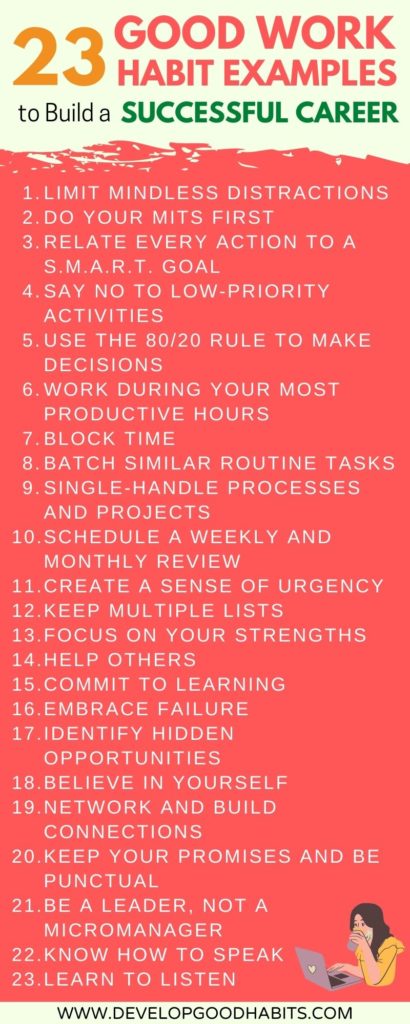There might be affiliate links on this page, which means we get a small commission of anything you buy. As an Amazon Associate we earn from qualifying purchases. Please do your own research before making any online purchase.
Are your work habits holding you back from a successful career?
Do you want to set your business up to thrive, but just can't propel yourself to the next level?
Interested in actionable strategies that can help you stand out from your competition?
If so, then check out these 23 good work habit examples.
Here you’ll discover a variety of tips and strategies that can increase your productivity and job satisfaction, and help you approach your work life in a more effective way.
Let’s get to it.
1. Limit Mindless Distractions
According to one statistic, 36% of Millennials and Gen Z workers spend two or more hours checking their phones. If you can limit this type of mindless distraction, then you’ll instantly stand out from your co-workers.
Of course you want to take breaks every now and then to read a quick article or text your spouse. However, if you spend too much time on these pointless pastimes, you are taking important time away from yourself that should be spent on your business.

If you spend too much time on pointless pastimes, you are taking important time away from yourself that should be spent on your business.
To have a successful career, you need to limit the amount of time that you waste, and try to keep distractions to a minimum.
If you want to implement this good work habit, then start by setting a time limit on your breaks and mindless activities.
For example, if you successfully complete a task, then you can reward yourself with a five-minute break of mindless activities.
To help you reduce mindless consumption, take a few weeks to keep track of how long you spend on everything you do. Record your actions in a software such as Rescue Time so you are able to look back and analyze how much time you are wasting, and where you can make improvements.
Finally, if you frequently feel bored at work, then here is a list of career-boosting activities that help you pass the time in a productive manner.
2. Do Your MITs First
Leo Babauta introduced a very simple idea to help people increase their productivity.
The idea is to identify your MITs (most important tasks) and get them out of the way in the morning. This way, no matter what else you get accomplished that day, your MITs will be completed.
- Every morning, pinpoint the three tasks that have the biggest impact on your work success.
- Prioritize this list so you complete the most critical task first and move on from there.
- Make sure that two of these tasks are directly related to a current project that you are working on, and one task is part of a long-term goal. Also, one of your daily MITs should be a habit that you want to complete every day.
- Start working on your first MIT as soon as you get to work, and don't stop until it is completed.
- Continue on to complete your second and third MITs so you are then able to spend the remainder of the day working on things that are still important, but not critical to your success.
Out of all the good work habits listed in this article, prioritizing your MITs over other tasks can have the biggest positive impact on your career.
3. Relate Every Action to a S.M.A.R.T. Goal
Make sure that everything you do is somehow related to one of your goals. Before starting something, determine how it fits in with your long-term plans.
If you are able to directly tie the task to a written goal, then make time to do it. However, if you are unable to link a project with one of your long-term goals, then consider delegating it to somebody else, or completely eliminate it.
Making clear goals is your first step to fighting procrastination. Being able to prioritize your tasks and identify what is important helps create a framework for your daily routine. This will keep you from getting stuck on a specific task because you will be able to identify how each action fits in with your long-term goals.
By regularly setting goals, you will never find yourself working on a project that will not benefit your mission. S.M.A.R.T. goals stand for specific, measurable, attainable, relevant, and time-bound.
These goals can be set for any area of your life and help you define exactly what you want so you are able to know when you reach your goal.

Making clear goals is your first step to fighting procrastination. Prioritize your tasks and identify what is important to create a framework for your daily routine.
To set your S.M.A.R.T. goals:
- Think about everything you want to achieve in the next three months and create an action plan for success.
- Each day, review these goals and analyze your progress. If you find that you are spending time on projects that don't relate to one of your S.M.A.R.T. goals, eliminate it or delegate it to another person.
- Evaluate your overall success after three months to see where you could have made improvements, and where you were really able to excel.
- Moving forward, create new goals for the future that are even more challenging, and continue to prioritize your daily activities to ensure that you are always working towards your S.M.A.R.T. goals.
To learn more about this concept, be sure to check out our ultimate guide to setting and achieving SMART goals.
4. Say No to Low-Priority Activities
Don't be afraid to turn down requests to work on projects that don't align with your objectives. While we all have to spend some time doing things we do not want to do, often we agree to projects because we don’t want to disappoint others.
Don't make it a work habit to always agree to things that are asked of you. Rather, only spend your time working on the projects that directly relate to your purpose.
This does not mean that you are making excuses to get out of helping other people. It simply means that you have a valid point of not having the capacity to spend time on a task that is not your priority.
People are often hesitant to say “no” because of the fear of the reaction from other people when you’re insinuating that their priorities are not your own.
Here’s a process that will help you get over this fear so you can optimize your time at work:
- Identify the mandatory tasks. Don't waste your time trying to get out of doing things that must be done. Instead, accept that there are some things that you simply have to do no matter how much you don’t want to, and get them done.
- Analyze each request that is presented to you against your current priorities and projects.
- Be up front. If someone requests you to do something and you know there is no chance that you will follow through, don't waste your time or theirs by pushing them off. Tell them right away that you are unable to help.
- Remain polite. Even though you are refusing to help someone, try to end the conversation on a positive note so they are not left with the impression that you are always unwilling to help.
And if you frequently struggle with this work habit, then here are seven effective strategies for saying no.
5. Use the 80/20 Rule to Make Decisions
Vilfredo Pareto came up with this principle to show that 80% of your results come from 20% of your efforts. This means that most of your progress comes from only a handful of the tasks that you do.
Once you are able to identify the 20% of your efforts that are making an impact, you can focus on these actions and proactively ignore the rest.
You can use the 80/20 rule to fight procrastination because it will help you to stop wasting time on tasks that are not getting you anywhere.
This can be done by five-step process to your daily work habits:
- Identify the 80/20 tasks. Single out the tasks that are generating 80% of your results. Having this information will help you make the decisions you need to make in order to be productive.
- Ask yourself if each of your tasks helps or hurts your 80% activities. This simple question can help you to eliminate tasks that are essentially wasting your time.
- Eliminate or delegate any activity that isn’t bringing you satisfaction or a measurable result. You can either delegate the activity to someone else or completely eliminate it.
- Don’t add—substitute. If you are presented with a new project and feel that it is important enough to spend time on, then eliminate a low-value activity to create time for your new project.
- Practice “creative procrastination.” When you know a project isn’t helping to generate 80% of your results, then put it aside and add it to a “someday” list.
Implementing the 80/20 rule is another powerful work habit. So if you’d like to learn how to master this technique, then take a few minutes to watch this video:
6. Work During Your Most Productive Hours
While there are numerous benefits to waking up early, you may not naturally be a morning person who excels before the sun comes up.
Perhaps you are a night owl who gets your boost of energy at midnight and can work well into the evening hours.
The key here is to identify when you are the most productive, and maximize that time. A critical workplace habit is to be intentional in the work you do and to finish your most important tasks during your most productive time of day.
- Keep a journal for a week of the times of day when you feel the most energized and productive.
- Once you have identified your “sweet spot,” spend this time completing the most important thing on your to-do list. Examine your business closely to determine the “one thing” that produces the biggest results, and do it during your peak hour.
- Before beginning each day, determine the one thing that you need to get accomplished in order to look back on the day as being a success. Make sure this task is finished.
- Use the rest of your workday to complete other tasks that produce the best results for your business.
7. Block Time
Time blocking is a tried and tested workplace habit that always leads to success.
Using the time-blocking method helps you to avoid multitasking and distractions so you can work uninterrupted, completely focused on one specific task during each block of time. This will allow you to take control of your time and complete your most important tasks.
One of the most effective time blocking strategies is the Pomodoro Technique. Here’s how to implement this productivity habit:
- Start by creating a list of activities in order of priority that you want to complete for the day, or during a specific block of time (Like your MITs).
- Then, set a timer for 25 minutes and begin working on the first task until the timer goes off.
- Follow this with a five-minute complete mental break where you set a timer and allow yourself to get up and walk away from the task.
- After you have completed your first Pomodoro and taken your break, start the second Pomodoro by picking up where you left off on your task list.
- Repeat this process throughout the day until your most important tasks are completed.
- Be sure to take longer breaks after completing every four Pomodoros to prevent you from getting burnt out.
To get started with this work habit, here are our recommended pomodoro apps and times, and be sure to watch this detailed video about the pomodoro technique:
8. Batch Similar Routine Tasks
This is similar to time blocking in the sense that you can lump similar tasks together and do them in batches to be more efficient.
Grouping small, similar responsibilities together can make it easier to get into the habit of completing these jobs since doing one small thing can trigger the next task in the batch. Perform your small tasks in a logical sequence to help you get in the habit of remembering to do each thing.
This will help to decrease procrastination since you will not have to think about what to do next as you simply move through the small tasks on your list.
So make a habit of knocking out similar routine tasks daily to free up more time and give you more mental focus to devote to finishing bigger tasks.
For example, batch the daily task of checking email to only twice a day. This way, it will not continue to interrupt you throughout the day.
Similarly, schedule an office day each week where you can set aside a specific amount of time to take care of miscellaneous tasks that come up during the week.
9. Single-Handle Processes and Projects
Rather than trying to multitask, a better habit is to focus on closing loops on your projects as soon as possible. Each day, take immediate action on every task that comes across your path in order to get it out of the way.
When you try to do multiple projects at one time, you likely will feel like you are doing a lot of work, when in reality you are getting nothing significant done at all. The more effective strategy is to focus on completing one project before starting another.
Not only will this habit help you get more accomplished, it will also help to keep your motivation levels high for upcoming tasks.
Single-handling is also an effective strategy for long-term projects. If you get out of the habit of picking up multiple things at the same time—or even smaller, unrelated tasks when you are trying to accomplish a larger goal—you will be more successful.
10. Schedule a Weekly and Monthly Review
In David Allen’s Getting Things Done, he urges his readers to do a weekly review of their upcoming projects to help prevent procrastination.
This easy process allows you to look at the upcoming week and schedule the projects that you want to accomplish.
A great time to do this is while you are reviewing your notes from your idea capture mechanism and going through new paperwork.
To do this, set aside a specific time each week to review three questions about your obligations:
- What are my personal obligations?
- What are my priority projects?
- How much time do I have?
Schedule a specific time during the upcoming week to get each item accomplished. During this time, also take action on any two-minute tasks, and create reminders to follow up on any non-actionable ideas.
Doing a larger monthly review is another way to keep yourself from feeling overwhelmed. This larger review will help you see what’s working, what’s not, and how things can be improved. This will help you “course-correct” any tasks that are not producing results.
Be sure to review your goals, adding new projects you’d like to pursue and deleting projects that don't benefit you. For each new project that you want to take on, create a detailed list of what needs to be done in order to accomplish it.
Also, don't forget to ask your 80/20 questions to help eliminate the tasks that don’t have a significant impact on your life.
To learn about this work habit, here is a seven-step process for planning your week.
11. Create a Sense of Urgency
While you don't want to rush yourself, an important work habit is to have a sense of urgency so you are able to complete projects faster and be more efficient. Even if you have a week to complete a project, make a habit of getting it done in three or four days.
To do this, create self-imposed deadlines. Challenge yourself to do things at a faster pace because often a task will take as much time as you give it. Don't neglect your time-blocking techniques to help complete your work uninterrupted.
12. Keep Multiple Lists
As we mentioned earlier, unless you write everything down, you are likely to forget many of the great ideas that pop into your head.
Also, attempting to store everything in your head can be very stressful and overwhelming.
When you are trying to remember everything you have to do, your mind is never fully focused on the task at hand.
In order to combat this, create and maintain multiple lists for the different areas of your life. Here are five steps for managing your time with lists:
- Keep project lists for every area of your life in a central location so you will remain organized.
- Break down large tasks into smaller tasks, and write down each step. To keep yourself from getting overwhelmed, use filters in your lists to show only the tasks you need to complete on a specific day.
- Set specific deadlines to create a sense of urgency, even if there isn’t an actual deadline for a task.
- Constantly evaluate your project list. If you notice certain projects have been on your list for a very long time, decide whether or not you want to keep focusing on them.
- Keep checklists for routine activities to force yourself to take action, especially if the routine tasks are easy to complete.
One app you can use for keeping multiple lists is Todoist. To learn more, here is an ultimate guide to effectively using the Todoist app.
13. Focus on Your Strengths
If you focus on your weaknesses, you will waste time working on tasks that will never be done as well as they would be if you left them up to an expert. In fact, the time you waste on them could have been better spent working on things that you do better than anyone else.
To illustrate this point, let’s talk about Chris Ducker and his 3 Lists to Freedom concept. Create a table with three columns:
Doing this will help you to focus on your strong points and spend your time only doing things that you excel at doing, so no project is completed poorly.
14. Help Others
When you help other people, you will actually end up helping yourself as well. For example, doing regular volunteer work can help you improve your social and relationship skills, especially if you are shy and need to work on your ability to initiate conversations with people.
Doing this will help you meet people you wouldn’t otherwise meet, which can also be a source of friendship, business contacts, or other types of connections that may be helpful in the future.
Helping out other people will also help you feel less isolated and depressed. Having the opportunity to escape from your normal, day-to-day activities is good for your mental health—and helping other people will make you feel good.
Finally, volunteering can help you learn new knowledge or skills that you can apply to your own life or business.
15. Commit to Learning
Continuous learning is one of the key good workplace habits. To stay ahead these days we need to stay on the bleeding edge of our careers.
Continue to expose yourself to new things on a regular basis, even if you don’t see an immediate benefit. You never know when a new skill will be applicable in your life, so take every opportunity to learn that comes your way.
Here’s an easy five-step work habits process to learning a new skill:
- Identify and focus on one specific skill that you want to learn.
- Learn everything you can about this skill.
- Create an action plan to master this skill.
- Combine your notes into one coherent whole.
- Take action each day to reach your goal.
And if you'd like a few recommendations to get started with this work habit, then check out these platforms to learn any skill.
16. Embrace Failure

Remember that everyone experiences failure at some time, and it opens up an opportunity for you to learn and do better next time.
Own up to your mistakes, and learn from them. Your failures can actually be important stepping-stones on your road to success.
The key is to remember that everyone experiences failure at some time, and it opens up an opportunity for you to learn and do better next time.
Believe it or not, there are four benefits to receiving negative feedback about your work:
- It helps you develop a standard of excellence.
- You will learn what people actually think about your product.
- You will gain a competitive edge.
- You’ll experience the firsthand results of your tested strategy.
17. Identify Hidden Opportunities
Alter your attitude about unexpected change and look at it as an opportunity that wouldn’t otherwise be there if the seemingly negative situation had not occurred.
Take the time to analyze your past challenges, and use them to gain perspective on your current projects.
For example, train yourself to find the silver lining in anything that comes up unexpectedly so you are able to see the good that can come as a result of the bad.
Start by brainstorming as many items as possible for the following prompt: “If [this bad thing] hadn’t happened, [this good thing] would not have occurred.”
Additionally, prepare yourself for unexpected change by thinking about the worst things that could possibly happen to you, and what you would do if these things occurred.
When you create these contingency plans, you will be better prepared for potential disasters in your life.
If you don’t believe in yourself, it will be hard for other people to have confidence in your abilities as well.
18. Believe in Yourself
In order to have a successful career, you need to believe in yourself. Without self-confidence, you’re less likely to try new things, take risks, or even seek out that next client.

The truth is, if you don’t believe in yourself, it will be hard for other people to have confidence in your abilities as well.
Create a strategy to improve your mood during periods of doubt:
Remember to expect failure at some point in your life, and take those opportunities to learn and get back up to try again.
19. Network and Build Connections
We are all responsible for doing our own work, but in order to have a successful career, you will need the help and expertise of other people.
In order to have this help available to you, you have to constantly manage your network of people, and work to grow and strengthen it.
This may involve reaching out to someone in your industry each day, and committing to networking events that will help you develop these relationships.
If you are able to find opportunities to help other people, they will likely do the same for you in return. Work to create a solid group of people that you can surround yourself with that have goals that align with your own.
Facebook and LinkedIn are great resources to connect with like-minded people who you can develop mutually beneficial business relationships with.
Remember that it is best to meet people in person and not always resort to technology for communication. Aim to have a face-to-face meeting with someone at least once a week, and become active in “Meetup” opportunities and market-specific conferences.
And if you’re not comfortable with this work habit, then you can set specific SMART goals that can help improve your networking skills.
20. Keep Your Promises and Be Punctual
It is an important business practice to keep the promises that you make to other people so they see you as being dependable.
One important way of developing this habit is to think carefully before you agree to commitments. It is better to initially decline to commit to something and later be able to come back and follow through with the task than to make a promise that you will not be able to keep.
It is also better to commit to fewer obligations than it is to make weak promises that often fall through.
Even if you have a good excuse for missing work in certain instances, make sure that you are always able to show up on time for your commitments. This will also show people that they are able to depend on you.
When you have a meeting scheduled, give yourself a 15-minute buffer to account for anything unexpected that may come up.
Finally, if you are unable to keep a promise, it is important that you address it and own up to it. Apologize to anyone that has been affected, and don’t make excuses.
Take some time to reflect on why you failed to keep your promise so that you can fix the underlying issue and never do it again.
To learn more about this work habit, here are a few strategies you can use to become more punctual.
21. Be a Leader, not a Micromanager
One critical work habit is to develop positive relationships with people who are working with you and for you.
When you micromanage your team members, they will feel as if they are not trusted to do their assigned jobs. While your team members probably value your input, giving constructive feedback is very different from micromanaging people and telling them how to do their jobs.
Here are a few things to consider:
- A good leader inspires and encourages team members to do their best work by assigning tasks that are in line with their individual strengths. It is best to acknowledge these strengths when assigning tasks so people feel encouraged in their ability to be successful.
- Leaders also set clear expectations about what is needed so their subordinates know what their missions are, and feel free to come forward with questions.
- Leaders create a vibrant and positive working environment to help team members do their best work. This should include giving praise where it is due, and even offering rewards to people who have gone above and beyond the call of duty. Always trust that your team is doing their assigned job to prevent yourself from slipping into a micromanagement role.
If someone happens to make a mistake, work on how you can remedy the mistake for the future and avoid having it happen again. Ruminating on the mistake will prove to be a waste of time, and will likely make your team member feel defeated.
If you do find that you have a tendency to micromanage, admit this to your team members, and tell them that you are committed to doing a better job at trusting them to do their best work.
To help you build better relationships with your team members, here are some great team building questions you can use as ice breakers.
22. Know How to Speak
If you are able to articulate yourself properly, people will view you as being trustworthy and dependable. Alternatively, if you are not able to properly communicate, people will start to believe that you don't know what you are talking about.
Of course, not everyone is a strong public speaker. However, whether this seems fair or not, people will judge you based on your ability to properly communicate your thoughts and ideas.
If you feel like public speaking is one of your weaknesses, look into networking events and conferences where you can speak with like-minded people and practice your elevator pitch on those who will listen.
This “elevator pitch” should be a summary of your business that can be given in the amount of time it takes to ride an elevator. Keep it precise and to the point, which will help you become comfortable talking about what you do.
You can also join Toastmasters or take a public speaking class to force yourself into a situation where you have to speak in public and get direct feedback on your performance.
23. Learn to Listen
If people offer you constructive criticisms and feedback, take them to heart so you can learn and improve. Aside from verbal feedback, pay attention to people's body language to get a feel for how they are interpreting what you are saying.
Speaking is only a portion of the communication process, and is often less valuable than listening.
Have you ever interacted with someone who talks so much that you can't get a word in?
If so, you probably recall looking for a way to escape the conversation as soon as you could.
A few tips on active listening:
This does not mean that you are a pushover, but rather that you have interest in what other people are saying because you see an opportunity to learn from them and use their information to make your business more successful.
Ask for feedback on your work, and listen when it is being given. It is important to remember that other people may have knowledge or insight that you have yet to learn, so it is best to take the time to absorb what they are saying.
If you struggle with listening, then work on this skill by playing a short audio clip and then writing down what you remember at the end of the clip.
Playback the audio and see how much you were able to remember and write down. Not only will this develop your listening skills, it’ll also sharpen your memory.
Final Thoughts on Good Work Habits
It’s not hard to build a successful career. The trick is to focus on building a series of good work habits (and breaking the bad work habits) that help you stand out from the competition.
So if you’d like to take that next step, then I recommend that you review this list again and pick one or two work habits that sound interesting. From there, commit to focusing on them for the next 30 days.
If you need extra help, then be sure to check out this step-by-step guide on building habits that stick.
Related Habit Posts:
- Good Daily Habit List To Transform Your Life
- 11 Examples of SMART Goals for Project Management
- How to Prioritize Tasks: Methods That Work



This article is very helpful. You’ve done a very good job.
Thank.